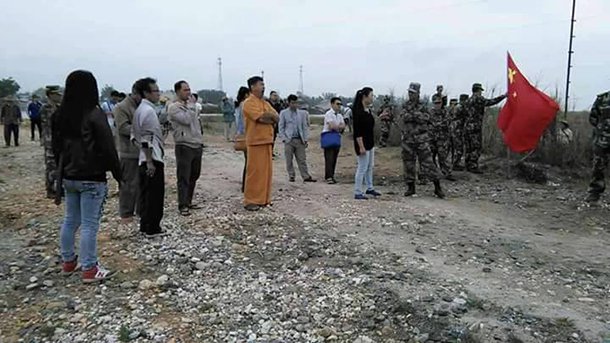RANGOON — Long-standing land disputes along Burma’s border with China were reignited on Friday as Chinese officials demarcated territories within Burma for a planned bridge linking the two countries, according to locals.
Farmers who live and work in Namhkam, northern Shan State, told The Irrawaddy they are concerned that they will lose about 150 acres of ancestral lands that have now been cordoned off with flags.
“It is unacceptable that China posted their flags in Burma’s territory,” one local, who wished to remain anonymous, told The Irrawaddy, urging the government to “seriously address the alleged encroachment.
Sai Tin Oo, a state lawmaker from Namhkam, said the area is no stranger to land disputes between local farmers and Chinese authorities. In 2014, he said, a similar case was brought to the attention of the State and Union parliaments.
“This problem has existed for a long time. This time, some authorities and armed personnel from China came and erected flags, saying it was for the construction of a bridge. This is an area place where Namhkam villagers farm,” said Sai Tin Oo.
The proposed bridge would cross the Ruili River, which runs along the border of the conflict-stricken state from Muse to Namhkam.
In May of last year, government officials of the two countries erected new border posts in a number of villages in Namhkam Township, including Kongsa, Bannaung, Saekhun and Hatkin.
Shortly after the demarcation, locals staged a protest and destroyed the border posts, claiming that around 150 acres of land owned by locals had been absorbed into Chinese territory.
Shan State Chief Minister Sao Aung Myat made field visits to the area in June to assess the dispute, and locals wrote to President Thein Sein to call for intervention.
Burma’s Foreign Minister Wunna Maung Lwin vowed in August that the two governments were working toward a resolution.
Border demarcation in the area was based on a 1995 agreement between Burma and China, lawmakers said.

















